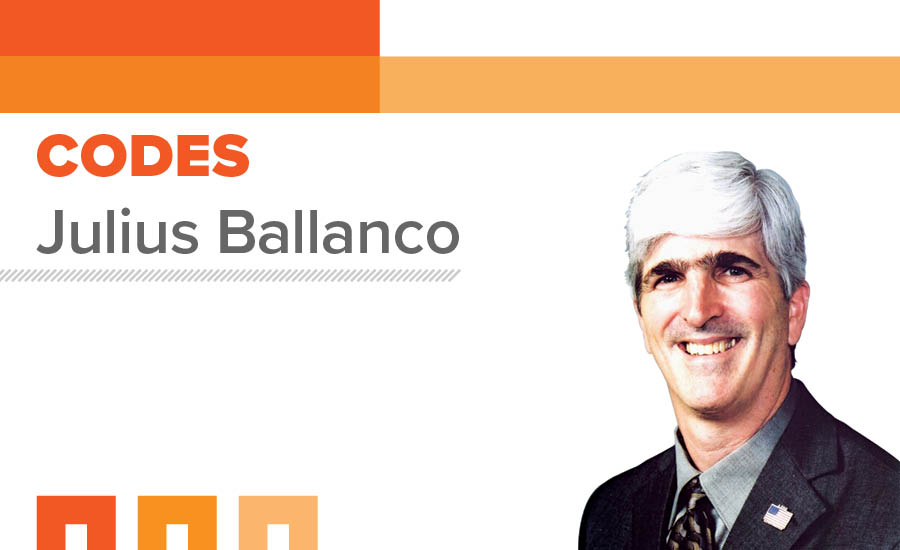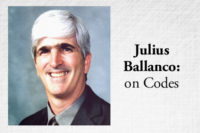Stealing from the wisdom of Yogi Berra, this year’s ICC code-change cycle is like déjà vu all over again. That is what has occurred with residential sprinklers and water conservation.
The Group B Cycle for ICC includes code changes to the International Fire Code, International Energy Conservation Code, International Residential Code and structural requirements of the International Building Code. The remaining changes are the administrative provisions to all the codes.
One of the most contentious issues in the IRC is the mandate of residential sprinkler systems for all one- and two-family dwellings and townhouses. The requirements were added to the IRC nine years ago. The residential sprinkler requirements have remained in three editions of the code, beginning with the 2009 edition.
The homebuilders in many states have convinced local politicians to prohibit residential sprinklers in one- and two-family dwellings through state laws. The result is that when adopting the IRC, an amendment is necessary to remove the sprinkler requirements from the code in these states. On the flip side, there have been a number of states that have adopted the mandatory sprinkler requirements for one- and two-family dwellings and townhouses because of what appears in the IRC. The majority of these states only have adopted the townhouse requirements.
Getting on the board
It was somewhat shocking that building inspectors submitted code changes to move the sprinkler requirements from Chapter 3 to the appendix of the IRC. These changes were not instigated by the National Association of Home Builders.
One change, RB129-16, was submitted on behalf of Gulf Coast Region IX. ICC is subdivided into various regions of inspectors’ associations. Region IX includes Louisiana, Mississippi, Alabama and Florida. Region IX has never submitted a code change.
Every code change requires a technical reason to support the change. Region IX included the following statement in their reason, “...a great deal of effort is required to edit the IRC each time it is adopted.”
Your first thought should be, “You’ve got to be kidding me, that is a reason for removing a life-safety provision from the code?”
At the public hearing in Louisville, Ky., the testimony was directed to a single change, RB129-16. The discussion had to do with whether to remove the sprinkler section and place it in the appendix based on many state-elected officials enacting legislation that the homebuilders orchestrated. Or it could be left alone. The testimony was rather civilized with the normal back and forth between support and opposition to the change. The final vote was to reject the code change by a one-vote margin. Thus, the committee recommendation is to leave the residential sprinkler requirements in Chapter 3 of the IRC.
ICC allows anonymous code changes to be submitted, whereby the proponent merely has to list their name. One change to remove the residential sprinkler requirements completely from the code was submitted by Brian Johnson. There was no affiliation, email address or contact information provided. If you search “Brian Johnson” on the Internet, you come up with more than a quarter-billion results.
Whoever this individual is, he indicated in part of his reason, “There is no evidence the prescriptive provisions in P2904 were reviewed by or developed by a professional fire protection engineer or other similarly skilled individual or that they received any peer review.”
This has to be one of the most preposterous statements supporting removing the sprinkler requirements. Everyone in the code profession is well aware of the extensive peer review that the sprinkler requirements in Section P2904 of the IRC underwent before being added to the 2009 IRC. Fortunately, that code change was basically ignored and recommended for rejection.
Jurisdictional issues
The other déjà vu moment was the series of proposals to add water conservation requirements to the IECC. The proponents of these changes submitted the same code changes to the Plumbing Code (IPC) during the Group A Cycle. The changes to the IPC to lower the flow rates for showers and lavatory faucets were rejected last year. So, the proponents decided to try the IECC.
Technically, the ICC staff should have rejected the water conservation code changes. All code changes must follow the Code Correlating Committee’s designation as to what code the change should be submitted to and what code change committee should review the proposed code change. Many years ago, the Code Correlating Committee identified water conservation as being a plumbing issue, not an energy issue.
How this group of code changes snuck past the ICC staff is anyone’s guess. It should be noted the IECC has two committees; one for the residential part of the code and the other for the commercial side. Neither committee has a plumbing professional on the committee. That is not to say they aren’t wonderful people. They simply are not in the plumbing profession, or well-versed on plumbing code requirements.
The proponents’ argument was that showers and lavatories use hot water. Since water is heated by energy, the IECC should regulate flow rates for lavatories and showers. The proponents ignored the fact many buildings heat water with solar energy (a renewable energy), hence there is no use of electricity, gas or oil.
They also ignored the fact that, in many locations, public lavatories are supplied with cold water since the water temperature falls within the limitations of tempered water. Another fact that was ignored is energy is a part of every segment of the plumbing profession.
Are we going to have the IECC start regulating the pressure to plumbing fixtures? After all, pressure is the energy that moves water through piping. How about regulating the materials for plumbing systems since each material requires a different amount of energy to make the product? We could go on and on. The bottom line is the IECC is not a water conservation code, it is an energy code.
The IECC residential committee was smart enough to recognize that water conservation is a plumbing issue and belongs with that committee. It voted to reject all the code changes based on the fact water conservation is outside the scope of the IECC.
The IECC Commercial Committee wasn’t as well-informed. It actually voted to approve the code change to lower the shower head flow rate. As a result, the ICC Board of Directors will have to deal with an appeal being filed, claiming the code changes should not have been accepted to the IECC. We’ll just have to wait for a decision on that appeal.
If you want to review all the code changes and recommended action by the code committees, they can be downloaded from www.cdpaccess.com.
This article was originally titled “Here we go again” in the May 2016 print edition of PM Engineer.



